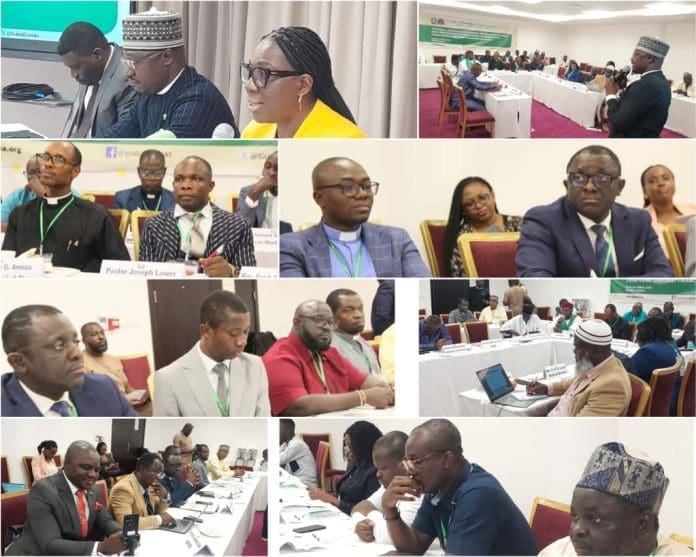
By [KingsleyAsiedu]
In a significant move to bolster West Africa’s financial integrity and social resilience, the Inter-Governmental Action Group against Money Laundering in West Africa (GIABA), in collaboration with Ghana’s Financial Intelligence Centre (FIC), launched a two-day National Sensitization Seminar on Anti-Money Laundering and Counter-Financing of Terrorism (AML/CFT) for religious leaders and institutions in Accra on Tuesday.
The seminar, themed around the strategic role of faith-based institutions in combating illicit financial flows, brought together a cross-section of religious figures from Christian and Islamic denominations, including representatives from the Catholic Church, Ghana Pentecostal and Charismatic Council, the Office of the National Chief Imam, and the Ahmadiyya Muslim Mission.
The opening address, delivered on behalf of GIABA Director General Edwin W. Harris Jr. by Tim Melaye of the GIABA Secretariat, underscored the urgency of engaging religious institutions in the global and regional fight against money laundering and terrorist financing.
“This programme is a clarion call on all of us to play our roles in ensuring a peaceful, secured, and economically viable nation through the instrumentality of religion,” Harris said in his remarks.
Established in 2000, GIABA is a specialized ECOWAS institution tasked with ensuring member states implement international AML/CFT standards. The organization, modeled after the Financial Action Task Force (FATF), conducts mutual evaluations, supports legal reforms, and offers capacity-building programs to combat financial crimes across West Africa.
A Growing Threat to Sacred Spaces
Speaking on behalf of Ghana’s Attorney General and Minister of Justice, Yvonne Atakora Obuobisa, Director of Prosecutions, warned of the increasing misuse of religious organizations by criminal networks.
“Faith-based institutions are sacred spaces meant to promote peace and compassion. Yet, their trust-based structure makes them vulnerable to being exploited by terrorist financiers and money launderers,” she stated.
She emphasized the need for strong internal controls within religious organizations — such as transparent bookkeeping, audits, and donor due diligence — to prevent abuse and safeguard both their congregations and core values.
From the Pulpit to Policy
The seminar included sessions on topics such as “Religious Bodies as Persuasive and Influential Anti-Corruption Institutions”, “The Role of Religious Leaders in Promoting Peace and National Cohesion”, and “Promoting Tolerance and Preventing Violent Extremism.” Resource persons led deep-dives into identifying and mitigating risks specific to religious organizations.
Kofi Boakye, Deputy CEO of the FIC, delivering remarks on behalf of acting CEO Albert Kwadwo Twum Boafo, echoed Ghana’s concern over the country’s exposure to financial crimes.
“Our recently published 2024 National Risk Assessment indicates that Ghana faces medium-level threats from money laundering, particularly in sectors like real estate, virtual assets, natural resources, and non-profit organizations,” Boakye revealed.
He stressed that religious leaders — as trusted voices in communities — are pivotal in addressing not only the technical aspects of financial integrity but also the underlying moral and ethical dimensions.
National and Regional Commitments
Ghana has implemented a suite of legal reforms, including the Anti-Money Laundering Act, 2020 (Act 1044) and Anti-Terrorism (Amendment) Act, 2014 (Act 875), to bring its financial systems in line with international standards. The recently launched 2025–2029 National AML/CFT Policy aims to close existing loopholes and increase oversight in high-risk sectors.
GIABA’s strategic engagement with faith leaders is not new. According to its Director General, the organization’s outreach began with youth and church-based programs in Nigeria and has since expanded into a broader program launched in 2017. Ghana is now hosting its second edition of the religious leaders’ seminar, making it one of the few countries to do so twice.
A Moral Duty Beyond Legislation
While acknowledging that legislation forms the backbone of any AML/CFT regime, speakers emphasized that real progress hinges on the collective vigilance of all societal actors — especially those wielding moral influence.
“Religious leaders must not only be heard but seen to lead by example,” said GIABA in its opening statement. “They are expected to speak the truth, counsel the errant, and report suspicious activities.”
Moving from Awareness to Action
As the seminar continues into its second day, the focus will shift toward equipping religious leaders with practical tools to integrate AML/CFT principles into their daily practice — from sermons and community outreach to institutional governance and donor management.
The message from all stakeholders is clear: religious leaders must move beyond the pulpit and become proactive guardians of both spiritual and financial integrity.
“This is not just a legal obligation,” Obuobisa reminded participants, “It is a moral duty — to protect our people, our faiths, and our nation.”
